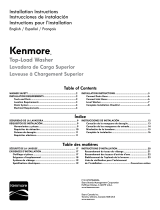
3
LOCATION REQUIREMENTS
Proper installation is your responsibility.
You will need:
n
A water heater set to 120° F (49° C).
n
A grounded electrical outlet located within 6 ft (1.8 m) of
power cord on back of washer.
n
Hot and cold water faucets located within 4 ft (1.2 m) of hot
and cold water ll valves on washer, and water pressure of
20-100 psi (137.9-689.6 kPa).
n
A level oor with maximum slope of 1" (25 mm) under entire
washer. Installing on carpet or surfaces with foam backing is
not recommended.
n
Floor must support washer’s total weight (with water and load)
of 315 lbs (143 kgs).
IMPORTANT: Do not install, store or operate washer where
it will be exposed to weather or in temperatures below 32° F
(0° C). Water remaining in washer after use may cause damage
in low temperatures. See “Washer Care” in your “Use and Care
Guide” for winterizing information.
Alternate Inlet Hoses: (may be required for some
installations, not supplied with washer)
n
8212656RP 10 ft. (3.0 m) Inlet hose, Black EPDM (2 pack)
n
8212641RP 5 ft. (1.5 m) Inlet hose, Black EPDM (2 pack)
n
8212546RP 4 ft. (1.2 m) Inlet hose, Black EPDM (2 pack)
n
8212545RP 5 ft. (1.5 m) Inlet hose, Red and Blue EPDM
(2 pack)
All dimensions show recommended spacing allowed, except for
closet door ventilation openings which are the minimum required.
For each arrangement, consider allowing more space for ease of
installation and servicing, and spacing for companion appliances
and clearances for walls, doors, and oor moldings.
Space must be large enough to allow door to fully open.
Add spacing of 1" (25 mm) on all sides of washer to reduce
noise transfer. If a closet door or louvered door is installed, top
and bottom air openings in door are required.
Custom under counter installation:
1"
(25 mm)
5"
(127 mm)
24 in.
2
(155 cm
2
)
48 in.
2
(310 cm
2
)
3"
(76 mm)
3"
(76 mm)
76.5"
(1943 mm)
6"
(152 mm)
1"
(25 mm)
Recessed area or closet installation
(stacked washer and dryer):
n
8212487RP 5 ft. (1.5 m) Nylon braided inlet hose (2 pack)
n
8212638RP 6 ft. (1.8 m) Nylon braided inlet hose, space
saving 90° elbow, hypro-blue steel couplings
(2 pack)
n
8212637RP 6 ft. (1.8 m) Inlet hose, Black EPDM, space
saving 90° elbow, hypro-blue steel couplings
(2 pack)










